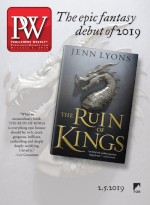Barbash’s novel The Dakota Winters (Ecco, Dec.) is about a family living in the storied Dakota building in the days leading up to the assassination of John Lennon.
Why a novel about a talk show host living in the Dakota in 1980?
I grew up five blocks from the Dakota at a time when the Upper West Side was still pretty dicey. We had a welfare hotel on my block where a serial killer murdered seven women. We also had Philip Roth living a few buildings away. I wanted also to explore the year leading up to the assassination—1980—when so much happened. A talk show host like the novel’s protagonist, Buddy Winter, seemed like the right lens through which to do that.
John Lennon is a major character in your novel. Was it daunting to attempt to create a plausible version of him?
Sure, in part because he changed so much from year to year. He went through a long trajectory in a short period of time. I read biographies and the memoirs of people close to him, his writings and his collected letters, and I watched over and over his interviews on YouTube to get the sound of his voice in my head.
You describe the Dakota in such beautiful detail. Did you have access to it?
During the writing of the book I got to visit twice and walk the hallways, especially the eighth and ninth floors, which I found so amazing—that there was a separate world up there. I sat in the living rooms of two separate apartments gazing up at the high ceilings, the grand old doors, the elegant interiors. You can feel the history, and easily imagine all the fascinating lives that have passed through.
Buddy Winter is a contemporary of Johnny Carson. What do you think he would make of today’s roster of late night hosts?
In Buddy’s day, you’d have an hour and a half, and you could ask more provocative questions and head off on intriguing side paths. Now, because of time constraints, the conversations tend to be more superficial than Buddy would probably like. I think he’d admire the crisp and often very funny monologues of Stephen Colbert and Jimmy Kimmel, and the raw debates on Bill Maher.
F. Scott Fitzgerald famously said, “There are no second acts in American lives.” In light of what Buddy, John Lennon, and Teddy Kennedy are attempting to accomplish in your book, do you think this is a valid statement?
Oh, I think there are second acts, and third ones sometimes. And Buddy, John, and Teddy are all proof. Teddy Kennedy became one of the most important senators in U.S. history, and I think John’s trip to Bermuda was the opening scene of his second act. Who knows what would have happened had he lived? I like to think the Beatles would have gotten back together again, even if it was only for one show, one glorious night. Why the heck not?



 Volume 265
Issue 40
10/01/2018
Volume 265
Issue 40
10/01/2018





